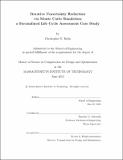Iterative uncertainty reduction via Monte Carlo simulation : a streamlined life cycle assessment case study
Author(s)
Bolin, Christopher E. (Christopher Eric)
DownloadFull printable version (1.785Mb)
Other Contributors
Massachusetts Institute of Technology. Computation for Design and Optimization Program.
Advisor
Timothy G. Gutowski.
Terms of use
Metadata
Show full item recordAbstract
Life cycle assessment (LCA) is one methodology for assessing a product's impact on the environment. LCA has grown in popularity recently as consumers and governments request more information concerning the environmental consequences of goods and services. In many cases, however, carrying out a complete LCA is prohibitively expensive, demanding large investments of time and money to collect and analyze data. This thesis aims to address the complexity of LCA by highlighting important product parameters, thereby guiding data collection. LCA streamlining is the process of reducing the necessary effort to produce acceptable analyses. Many methods of LCA streamlining are unfortunately vague and rely on engineering intuition. While they can be effective, the reduction in effort is often accompanied by a commensurate increase in the uncertainty of the results. One nascent streamlining method aims to reduce uncertainty by generating random simulations of the target product's environmental impact. In these random Monte Carlo simulations the product's attributes are varied, producing a range of impacts. Parameters that contribute significantly to the uncertainty of the overall impact are targeted for resolution. To resolve a parameter, data must be collected to more precisely define its value. This research project performs a streamlined LCA case study in collaboration with a diesel engine manufacturer. A specific engine is selected and a complex model of its production and manufacturing energy use is created. The model, consisting of 184 parameters, is then sampled randomly to determine key parameters for resolution. Parameters are resolved progressively and the resulting decrease in uncertainty is examined. The primary metric for evaluating model uncertainty is False Error Rate (FSR), defined here as the confusion between two engines that differ in energy use by 10%. Initially the FSR is 21%, dropping to 6.1% after 20 parameters are resolved, and stabilizing at 5.8% after 39 parameters are resolved. The case study illustrates that, if properly planned, a streamlined LCA can be performed that achieves desired resolution while vastly reducing the data collection burden.
Description
Thesis (S.M.)--Massachusetts Institute of Technology, Computation for Design and Optimization Program, 2013. This electronic version was submitted by the student author. The certified thesis is available in the Institute Archives and Special Collections. "June 2013." Cataloged from student-submitted PDF version of thesis. Includes bibliographical references (p. 97-103).
Date issued
2013Department
Massachusetts Institute of Technology. Computation for Design and Optimization ProgramPublisher
Massachusetts Institute of Technology
Keywords
Computation for Design and Optimization Program.